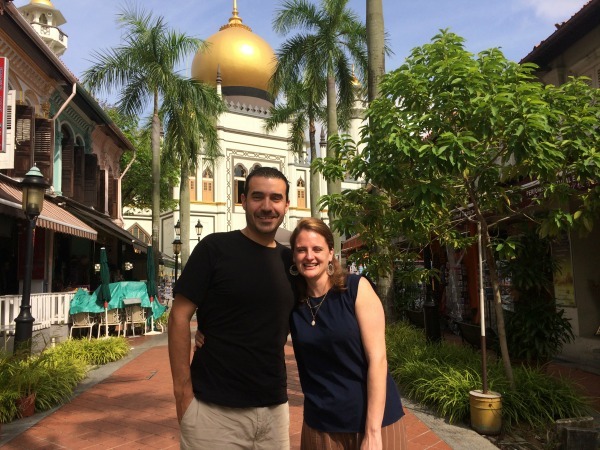A friend asked the other day if I recommended putting money into a certificate of deposit. We talked a bit about her goals and it struck me that with money, as in life, one should have a very clear idea of the purpose of your dollars before you make decisions about where to park them.
Mr. ThreeYear and I follow a simple financial plan with our money. It hasn’t been easy to simplify our savings and investments; we’ve had to eschew certain new accounts, consolidate investments, and roll over old 401Ks. The simpler things are, though, the less likely it is that I mess something up. The less likely I forget to make a contribution or pay a credit card bill. Money can be really complicated so in our experience, keeping things simple is clearer and easier.
We believe that our money goals should be equally simple, but unfortunately, sometimes they’re not. Sometimes we’re trying to accomplish multiple money goals at once and things get muddled.
It’s highly effective, in my opinion, to periodically take a step back and think about what it is you’re trying to do with your various dollars. What is the purpose of a particular pile of money? Then you can make better choices about where to put it.
Here are the questions we ask ourselves:

- What are our short-term goals? (In 2017, our short term goals were to max out 401Ks, replace our roof, pay off two car loans, cut our debt for our Chile apartment in half, and fund our kids’ 529 accounts).
- What are our medium-term goals? (Location Independence, double our net worth).
- What are our long-term goals? (Send our kiddos to college with no loans, retire early).

Then we ask, how should we best organize our different piles of money to reach those goals? Here’s how we currently have things set up:
Emergency Savings
Our emergency savings account is money that’s available to pay for expenses that we haven’t budgeted for, money to help us keep paying the mortgage and bills if someone lost a job, or other money emergencies. We generally keep about three months of expenses in this account. We’ve tapped into this account in the past to help us pay for expenses we couldn’t otherwise cash flow, like our new roof. Then we quickly build it back up. This money is liquid, because we want it to be readily accessible. However, it’s not checking account readily accessible, so we’re not tempted to spend it.
Our emergency savings dollars live in a Capital One account, and it takes about two days to transfer money out of that account and into our regular checking account. We could earn a higher interest rate with our money, which currently gets about 1% APY, but we want to keep our emergency dollars liquid. They’re there for back up, for peace of mind, and we’re okay with that small amount of money earning a small percentage of interest.
Retirement Funds
Our retirement dollars are hard at work funding companies’ expansions and lining the pockets of overpaid CEOs (kidding, sort of). We have three types of retirement funds: 401Ks, IRAs, and Roth IRAs. We max out the 401Ks but no longer qualify to contribute to the IRAs. We don’t save in Backdoor Roths, mainly because we don’t have that much extra money to invest. We also want to put some investing dollars in taxable accounts. Our retirement funds are largely invested in S&P 500 Index Funds, or Total Stock Market Index Funds. We also have a small, but important, percentage, invested in International and Bond Funds. They’re all passively managed index funds, and we have as much in Vanguard as we can. Mr. ThreeYear’s 401K is with Principal, but we have 100% invested in their fairly low-fee S&P 500 Index fund, which has an expense ratio of something like .18%, the lowest expense ratio offered on all their funds.
We are investing for several decades, and so these dollars need to earn higher rates of return. To that end, we should probably have nothing in bond funds, but they’re a small hedge. I’m okay with slightly lower returns for the peace of mind. We keep our expense ratios as low as possible by using Vanguard.

These are the dollars that will fund our lifestyle several decades hence, so these dollars must be hard at work, growing and doubling as fast as they can. We don’t, under any circumstances, touch these dollars. No loans to self, no looking on this pile of money as something we can tap into.
I have a friend who’s a CPA, who raided one of her retirement accounts (that had been funded by her husband’s employer at an incredible 13% or something) to put a down payment on a new custom home. Can I tell you that I didn’t touch that situation with a ten foot pole? Our retirement accounts are strictly off limits until retirement!
You can get super fancy with your retirement accounts, but it usually backfires. Unless you spend significant amounts of time researching stock buys (like Mr. Tako), I recommend taking a simpler approach to investing. The amount you invest is much more important than eeking out 1% more in returns.
Taxable Account
Our taxable account is our baby account. We didn’t start this account until 2018, because we were busy paying off debt, investing, and doing other things. But our taxable account is what will fund much of our early retirement that happens before 65. We may use funds from our taxable accounts to help pay for the boys’ college. Having a taxable investment account means that when we sell off funds, yes we’ll pay taxes on the gains, but it gives us a lot more flexibility than any money in our retirement accounts. Which are off limits for a long time, please remember. Our taxable account is at Vanguard in the Total Stock Market Index Fund. This money’s job is also to grow and multiply, so we’ll leave it alone as long as we can. We’ll add to it as quickly as we can.
College Fund
Both of our boys have a 529 fund at Vanguard for their college. Most of their college investing dollars are in the Total Stock Market index fund as well. They have a shorter time frame in which their money should grow, so we keep that in mind. Junior ThreeYear has seven more years of school after this year is over. We have significantly more to fund in order to pay for four years of in-state tuition, but we also know that our taxable account may be a source of funding as well.

We do not want our boys to graduate college with debt. It’s important to us that they understand that we believe that graduating college with debt is crippling to your ability to achieve financial independence. Yes, people do it all the time, but we’re fortunately in a position where we have enough income that we should have been able to save enough to fund college for them, especially since our parents gave us the gift of graduating debt free.
Short-Term Savings
We also save money up for short-term goals like paying for airline tickets, taking vacations, and replacing appliances. Because we use YNAB for our budgeting, we keep “Envelopes” in our general checking account with money set aside for such goals. It’s kept right in our checking account, ready to spend if we need it. I don’t look at our checking account balance. YNAB allows me to know if we have enough money to pay the bills, so I don’t worry about that balance. It’s become very helpful for cash flow purposes. We are still not a month ahead as they recommend that you become, but I have a feeling we’ll get there before the end of the year.
Other Accounts
We also have a Flexible Spending Account with money for our healthcare expenses and I have a separate business checking account where I put aside 25% of my earnings for quarterly taxes, since I’m a contractor. We have a checking account in Chile that we used to pay our monthly mortgage on our apartment there in the past. Now we keep a bit of cash there for any needs the apartment might have (luckily there are few).
How do your piles of money work for you? What are your money goals this year?



we’re trying to get enough w-2 money from mrs. smidlap’s part time job to fund the full 6500 to each roth ira. i consider it the king of all money with the tax free withdrawals in retirement, even on gains and dividends. what did you tell the friend who asked about the CD? to me, that’s right up there with annuities and whole life insurance. they are bound to enrich the person selling you the product!
Nice! Yes the benefits are pretty sweet from Roth IRAs–I love the Mad Fientist’s assessment of the different retirement options. For my friend, I recommended that she just keep the money in an emergency fund, and if she wanted to earn a higher interest rate then she should put money in her investment accounts. The only caveat to that in my mind would be if you’re extraordinarily risk averse and prefer to have lots of cash on hand. Then you could put half your cash in a CD for a slightly higher interest rate.
What a great plan! And great progress as well. You’ll be successful, and my guess is that like my wife and me, you will find that even after you early retire you won’t need to withdraw much, if any, from your portfolio. I bet you will be making enough from side gigs to pay your costs with a zero withdrawal rate.
Thanks so much for the vote of confidence Steveark! 🙂 That would be amazing. We’re still working on the spending part, because that’s definitely our hurdle right now. But I feel like we’re slowly getting there.
I agree that keeping things simple is key, as is having your finances organized in “buckets” for specific purposes. The nice thing about most of the savings vehicles you mentioned is the automation. The money goes where it needs to and grows – out of sight, out of mind, which means it doesn’t get spent! I’m glad you guys are setting aside money for things like flights and travel. Taking advantage of life experiences, both as a family and as a couple, is an important goal too.
Thanks Kara. I’ve noticed that you’ve worked hard to keep things simple for your family. I agree that automation has been such a great savings/investing tool because we just become used to having less money hit our checking account so there’s less to spend.
We’re excited about our financial goals but I honestly think if we had to pursue them without traveling, we’d be a lot less motivated. 🙂 As I’m sure you can appreciate, travel is a big one for us. Plus, the kids grow up so fast!
Hey
Hope you are well. Apologies for not keeping in touch, I’ve been busy building a website.
May I ask if you have considered having a tenant for the house in Chile?
Secondly, its smart how you park your money to fund your goals! I will have to see if there are any ‘investment’ type accounts in the UK.
Thanks Mohammed. Congratulations on the website! 🙂 We have had a tenant in the house in Chile in the past, but we bought it for a relative who’s living there now. For now we only count the principal towards our net worth but the apartment would bring in around $7000/year if we rented it. I wish I knew more about investment accounts in the UK but I bet there are a lot of options. Looks like Vanguard is one of them: https://www.vanguardinvestor.co.uk/ Cheers!!
Thanks for the link Laurie. I will be looking into those accounts as part of the permanent retirement plan!
Good on you for housing a relative over a tenant. Very giving of you guys!
Family first, always. 🙂 I hope you can find them useful Mo!
I have to admit I just have most of my money on autopilot, and don’t spend too much time thinking about things, which is really liberating.
I just pay myself into my current account, then it goes out to ISA/Taxable. And my company pays into my SIPP.
I don’t tend to portion out specific amounts for goals etc, it’s all one big pot.